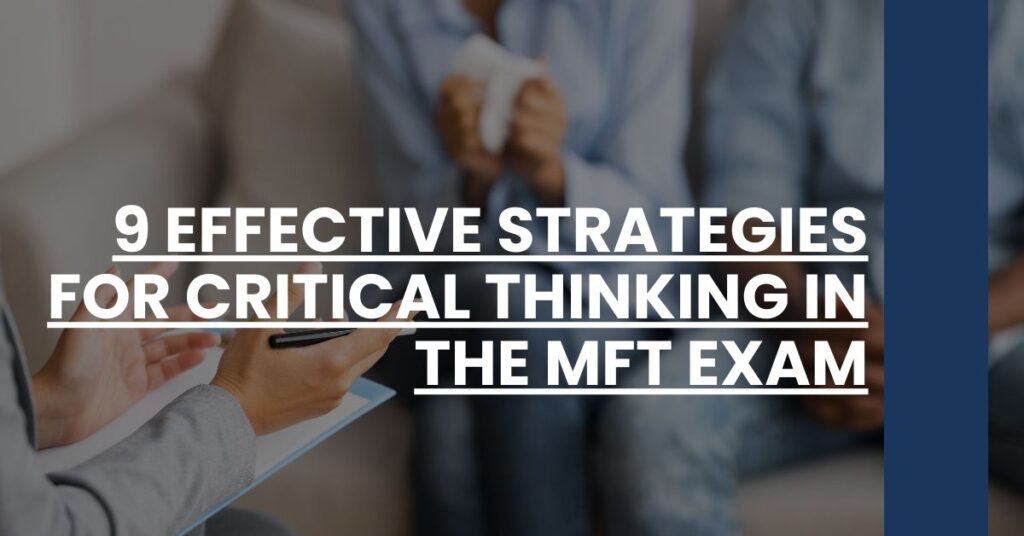Are you feeling the pressure as you gear up for the MFT exam and the critical thinking it demands? You’re not alone.
Our guide zeroes in on precision-targeted Strategies for Critical Thinking in the MFT Exam, steering you away from the generic advice maze and sailing straight into tactics that elevate your reasoning prowess.
With these strategies, the complexity of deciphering family therapy scenarios will transition from daunting to doable. Get ready to carve a path through the thicket of tricky questions and emerge as a sharper, more discerning aspiring therapist.
- 1. Understand the MFT Exam Format
- 2. Develop a Logical Reasoning Framework
- 3. Enhance Your Problem-Solving Techniques
- 4. Practice with Realistic Scenarios
- 5. Learn to Dissect Complex Questions
- 6. Master Time Management During the Exam
- 7. Utilize Metacognition for Self-Check
- 8. Engage in Peer Discussions
- 9. Reflect on Your Answers Post-Practice Exams
- Leverage Educational Resources
- Stress Management Techniques
- Conclusion: Strategies Synthesis and Next Steps
1. Understand the MFT Exam Format
Embarking on your journey to becoming a licensed Marriage and Family Therapist (MFT) requires a solid grasp of the MFT exam format, a cornerstone among strategies for critical thinking in the MFT exam. This standardized assessment is your gateway to validating your grasp of core concepts and clinical reasoning vital to family therapy.
- Exam Structure: The MFT exam is meticulously structured, consisting of 170 multiple-choice questions, with 150 of these being scored and 20 ungraded experimental questions. The nature of these questions goes beyond mere recall of knowledge, as they delve into scenario-based evaluations, where your decision-making and problem-solving prowess are put to the test.
- Question Domains: These questions span across various domains of family therapy practice. Each represents a specific area such as assessment, diagnosis, treatment, ethics, and legal issues, expecting you to blend clinical knowledge with sharp analytical scruples.
- Purposeful Familiarity: Acquainting yourself deeply with the exam’s intricacies can serve as a catalyst in maximizing your confidence and optimizing your thinking process. This encourages a strategic approach, where you parse through questions with a focused, practiced ease.
Recognizing the importance of exam familiarity will serve as a framework for your study plan and will guide your critical thinking efforts ensuring that you are as prepared as possible on exam day.
2. Develop a Logical Reasoning Framework
Developing a logical reasoning framework equips you with a robust mechanism for dissecting MFT exam questions, making it a powerful addition to your strategic toolkit for critical thinking. This entails cultivating a habit of approaching questions systematically, analyzing every angle before jumping to conclusions.
- Identify Underlying Assumptions: Begin by pinpointing assumptions in the question stem. What underlying beliefs or perspectives does the question hold?
- Conceptual Analysis: Break down complex terms and concepts. Make sure you fully comprehend the therapeutic constructs before considering the answer options.
- Inferential Judgement: Assess the logical connections within the question. How do the parts fit together, and what conclusions can you logically infer?
- Evaluation: Critically evaluate the answer options, weighing evidence against the clinical scenario posed, ensuring your choice aligns with the best therapeutic outcome.
Creating a systematic approach grounded on logical analysis not only sharpens your critical thinking skills but also enhances the efficiency with which you tackle multifaceted questions.
3. Enhance Your Problem-Solving Techniques
Effective problem-solving techniques are paramount when navigating the waters of the MFT exam. Given that family therapy is fundamentally about resolving intricate interpersonal issues, you’ll need to apply similar problem-solving tenacity on your exam.
- Solution-Focused Thinking: Embrace a mindset that seeks not only to understand problems but actively sets your sights on viable solutions.
- Creative Ideation: Family therapy often requires creative intervention strategies. Cultivate this creativity when considering multiple-choice answers; this could illuminate distinctive pathways to the right response.
- Analysis of Variables: Every family dynamic is unique, laden with variables that affect outcomes. On the exam, weigh each answer against potential real-world nuances.
The practice of problem-solving does more than prepare you for test day; it’s a lifelong skill with the transformative power to affect real change in future clients’ lives.
4. Practice with Realistic Scenarios
Nothing beats the tried-and-true method of practicing with realistic scenarios; one of the essential strategies for critical thinking in the MFT exam. This exposes you to the nature of the questions and allows you to apply your knowledge in exam-like conditions.
- Mock Exams: Regularly engaging in mock tests simulates the pressure and format of the actual exam.
- Case Studies: Delve into diverse case studies to stretch your application skills across various theoretical frameworks and client presentations.
The practice does not make perfect, but it does cement your understanding and prepares you for the practical application under the scrutiny of the testing environment.
5. Learn to Dissect Complex Questions
Developing a knack for dissecting complex questions is a staple among strategies for critical thinking in the MFT exam. Here’s how you can build this skill:
- Read Actively: Approach each question attentively, highlighting key information and discerning distractors from crucial facts.
- Ask Guiding Questions: Challenge each section of the question with prompts like “What is the core issue here?” or “What information is this question leading me to consider?”
By effectively breaking down questions, you ensure that you’re not just skimming the surface but truly engaging with the material, paving the way to understanding and success.
6. Master Time Management During the Exam
To excel in the MFT exam, managing the ticking clock with finesse is as significant as the intellectual rigors of the test itself. Mastering time management during the exam is a definitive step in propelling your performance from proficient to exceptional.
- Pacing Strategy: Establish a rhythm that allocates ample time for reflection on each question without allowing any single item to consume disproportionate minutes of your examination.
- Priority and Order: Tackle questions in a sequence that suits your strengths; perhaps starting with familiar topics to build confidence or reserving complex questions for later to ensure focus when tackling them.
Time management is more than just watching the clock; it’s a strategic dance with time to ensure you’re giving each question the consideration it deserves while keeping pace to complete the exam.
7. Utilize Metacognition for Self-Check
Harnessing metacognition—or thinking about your own thinking—can be a game-changer during the MFT exam. By engaging in metacognitive strategies, you can monitor your understanding and thought processes in real-time, ensuring that you are on the right track with each question.
- Keep a Critical Eye on Your Thoughts: While answering questions, reflect on your reasoning. Ask yourself, “Does my line of thought make clinical sense?” and “Am I considering all aspects of the problem?”
- Check for Bias: Be aware of personal biases that may skew your interpretation of the question or the possible answers.
- Assess Confidence Levels: Gauge how certain you are about your answers. If you feel unsure, it might warrant a second, more critical look.
- Evaluate your Answer Choices: After making a selection, question it. Consider why the other options are less likely to be correct—strengthening your choice or revealing overlooked details.
By continually engaging in a self-check process, you hold your critical thinking to a higher standard, conforming your approach to be as reflective and as discerning as the MFT exam demands.
8. Engage in Peer Discussions
One of the most dynamic strategies for critical thinking in the MFT exam is to engage in peer discussions. Exploring concepts with colleagues or classmates exposes you to alternative viewpoints and can solidify your understanding or open up new avenues of thought.
- Deepen Conceptual Understanding: Sharing perspectives on theory and practice reinforces what you know and uncovers what you might have missed.
- Enhance Communication Skills: Exchanging ideas helps refine how you articulate complex concepts, an invaluable skill both for the exam and your future practice.
- Build Confidence: As you explain your reasoning to others, you’ll start to trust your knowledge base and your ability to navigate challenging material.
Joining study groups, forums, or workshops enable learning to be an interactive experience, augmenting the solo study sessions that play a crucial role in the learning process.
9. Reflect on Your Answers Post-Practice Exams
Upon completing practice exams, it’s crucial to reflect on your answers. This reflection step is like looking in the rearview mirror to gauge how far you’ve come in your journey to enhance critical thinking for the MFT exam, and to adjust your route moving forward as necessary.
- Identify Patents in Mistakes: Look for recurring errors that may point to gaps in knowledge or misconceptions that need addressing.
- Review Explanations for Correct Answers: Understanding why an answer is correct can be just as informative as understanding why another is not.
- Summarize Learnings: Create a summary of your insights and takeaways. This can be your guide to the areas that need more attention in your preparation.
Reflection reinforces learning by providing an opportunity to digest and integrate the feedback each practice test offers, enabling you to revamp your critical thinking strategies more effectively.
Leverage Educational Resources
To fortify your critical thinking in preparation for the MFT exam, it’s wise to leverage educational resources designed to streamline your studying efforts and offer comprehensive content coverage.
- Utilize Study Guides: These often provide synthesized material that focuses on key concepts, theories, and practice principles in family therapy that you will encounter on the exam.
- Online Practice Tests: Online resources may offer a realistic test-taking environment, complete with a timer and an array of questions that mirror the complexity of the actual MFT exam.
- Take Advantage of Workshops: Participating in workshops or webinars can offer in-depth explorations of tough topics, often provided by experts in the field.
Integrating varied resources into your study plan can provide both breadth and depth in your preparation, making your study time more efficient and effective.
Stress Management Techniques
Imparting a degree of relaxation amid the rigors of exam preparation, stress management techniques are pivotal to preserve mental clarity and promote the kind of focused thinking required for success in the MFT exam.
- Practice Mindfulness and Meditation: These practices can center your mind, reduce anxiety, and sharpen your concentration.
- Regular Exercise: Physical activity is not only a stress-reliever but can also improve cognition and mental stamina.
- Adequate Rest and Nutrition: Never underestimate the power of a good night’s sleep and balanced meals to fuel your brain for peak performance.
By incorporating stress management strategies into your regular routine, you ensure that your body and mind remain in prime condition for soaking up knowledge and applying it efficiently during the exam.
Conclusion: Strategies Synthesis and Next Steps
Congratulations on reaching the end of this exhaustive exploration of strategies for critical thinking in the MFT exam. Each strategy we’ve discussed builds upon the other, from understanding the exam format to leveraging educational resources and managing stress. The next steps are in your hands: integrate these strategies, make them a part of your study regimen, and practice continuously.
Now, as you forge ahead, planning your study sessions, remember that critical thinking isn’t just a skill—it’s a habit, one that will serve you well both in the exam hall and in the therapy room. Keep honing your intellect and nurturing your mind’s agility. Embrace the challenge, and use it to become not just a test taker, but also a thoughtful, reflective therapist ready to make a real difference.
Strategies for critical thinking in the MFT exam are key. Learn techniques to analyze, reason, and succeed with confidence.

